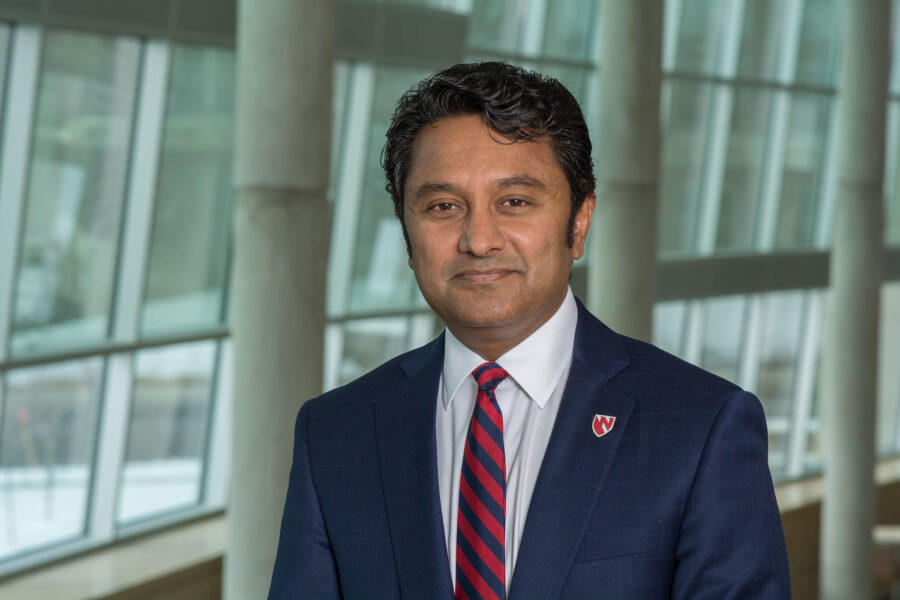Chandra Are, MBBS, of UNMC and the Fred & Pamela Buffett Cancer Center, is the lead commissioner of a new Lancet Oncology Commission report containing a pragmatic roadmap to reduce inequities and promote access to safe, timely and affordable cancer surgery for every patient worldwide.
This report by Dr. Are and colleagues — a group including global leaders and experts in cancer surgery from every region of the world — builds upon the 2015 Lancet Oncology Global Cancer Surgery Commission. The authors emphasize the importance and extraordinary demand for cancer surgery alongside persisting insufficiencies and inequalities, including the fact that while nearly 80% of patients with solid tumors will need surgery during their disease, in some countries, the vast majority cannot access even basic surgical care. With the global burden of cancer and its related morbidity and mortality expected to rise, this new commission will play a major role in improving access to cancer surgery globally.
Dr. Are and his colleagues unveiled the report at a launch event on Nov. 2 at the 3rd Indian Cancer Congress, held in Mumbai, India. The Indian Cancer Congress is a unique meeting because it is a joint meeting of all the four major oncology societies in India: Indian Association of Surgical Oncology, Indian Society of Medical and Pediatric Oncology, Indian Society of Oncology and Association of Radiation Oncologists of India. The commission also will be launched via a Lancet webinar at the 2023 London Global Cancer Week on Nov. 14 and at the 2024 Annual Meeting of the Society of Surgical Oncology, to be held in Atlanta, Georgia, and other countries in the future.
Taking stock of how the cancer surgical landscape has changed over the last eight years, this latest report states, “Although still marginalized in many avenues (e.g., visibility, importance, advocacy and funding), cancer surgery is less of an afterthought in cancer care, but further progress is needed.” This is especially pressing in the context of natural and economic catastrophic events, political instability and conflict, disruptive technological innovation and the COVID-19 pandemic — all with impacts on cancer surgery.
Dr. Are said that part of the challenge is that cancer leadership on the global stage is conspicuous by its absence. “The first commission shed some light, and that has helped, but not to the extent we want. It was felt that the time was ripe for another commission to continue that effort of improving access to cancer surgery, not only across the world, but even in Nebraska.”
He continues, “So, we included about 50 cancer surgery experts and leaders from across the world offering diverse perspectives, and we came up with a roadmap of pragmatic, simple and reality-grounded solutions and actions. These solutions and actions may not be moonshots but are ‘groundshots’ that are realistic and can apply to every part of the world. Far too often, we look forward to the next major technological breakthrough to improve cancer surgical care. Instead, what we need to do is also look at what we already have and see how it can be implemented better. In this fashion, we can improve access to cancer surgery to every patient who needs it, regardless of geographic location or socioeconomic status.”
Aimed at cancer surgeons, as well as leaders, administrators, elected officials and health policy advocates around the world, the 2023 Global Cancer Surgery Commission identifies “solution frameworks” across nine domains of cancer surgery, provides “close-to-implementation” interventions by WHO world region and closes by issuing eight broad actions to propel essential improvements in the global capacity for cancer surgery. (See infographics for more information.)
Lancet Oncology Commission on Global Cancer Surgery solution frameworks:
While the ethical imperative for action is outlined throughout the paper, the economic case for investment in cancer surgery is also made — exclusive of other surgical treatments, provision of cancer surgery alone would avert $12.1 trillion in direct economic losses worldwide from 2015 to 2030.
“Surgery is not only one of the most cost-effective methods of treatment, but also tends to be more durable for many malignancies. Unfortunately, for most patients, particularly for those in (low- and middle-income countries), restricted access to safe, timely, high-quality, and affordable cancer surgical care is a harsh reality. … We hope this Commission offers the practical guidance necessary to overcome these challenges,” authors state.
Cancer surgery is one of the most effective tools in cancer care, Dr. Are said. “Access to effective cancer surgery should not be a privilege for a few, but instead a societal necessity for all. The solutions to address this grave humanitarian imbalance need not always be astronomical in thought or cost. This commission aims to address this inequity through simple, pragmatic and reality-grounded solutions that can apply to every part of the world.”
Dr. Are was the lead commissioner of the 52-member international commission. He called his role a testament to the work of the Fred & Pamela Buffett Cancer Center, UNMC and Nebraska Medicine. “We at the Fred & Pamela Buffett Cancer Center are developing a national and international reputation, and our leadership role in this important commission is merely the latest example of that.”

Congratulations on your Lancet Oncology Commission report, Dr. Are. Well done!!
Congratulations! This is amazing work!
Congratulations! I appreciate your global leadership in cancer surgery.
CONGRATULATIONS DR. ARE ON YOUR LANCET ONCOLOGY COMMISSION REPORT !!!
Great work, Chandra – you make us proud!
Well done, Chandra.